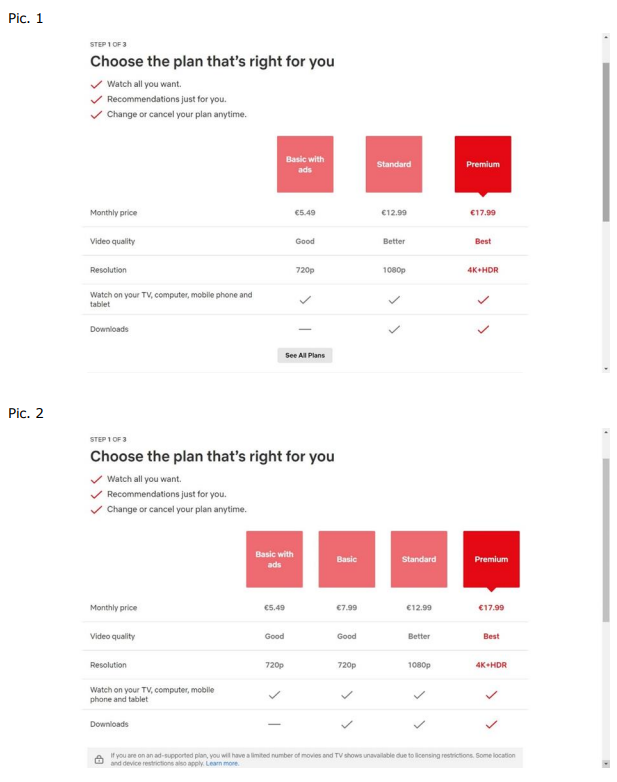This website uses cookies so that we can provide you with the best user experience possible. Cookie information is stored in your browser and performs functions such as recognising you when you return to our website and helping our team to understand which sections of the website you find most interesting and useful.
Euroconsumers takes a stance against Netflix’ use of dark patterns

Netflix has been making waves by cracking down on the practice of password sharing among consumers worldwide since early 2023. This has raised practical implications, concerns, and fundamental questions for people, which Euroconsumers directly addressed with the source earlier this month. Was the discussion fruitful? Actionable in follow-up for sure.
Stirring away from the Netflix we knew
In a shift from its previous stance, Netflix, the renowned streaming company that once embraced password sharing with the tweet “Love is sharing a password,” has taken action against account sharing worldwide. This clashes with the realities of households in 2023, as they require users to designate a primary location, connect all devices to the same Wi-Fi network, and verify non-associated devices by the main account holder. Children living in student housing or family members travelling abroad are just a few examples of how multiple households within the same family can be spread across different locations facing new challenges for using a service they paid for: access to multiple screens.
There is also a concerning impact on consumers’ privacy and security due to the continuous IP address monitoring, and questions around the use of VPN. But what’s even more concerning , is the misleading display of Netflix’ subscription plans, at a time when Netflix’ new account policy incites consumers to explore their options and they are now more than ever in need of a clear overview. It appears that in Italy and Spain the “Basic” subscription plan is not immediately presented to customers & only appears once they click on “see all plans”.
Euroconsumers steps in for consumers
All these concerns were outlined in a letter dated May 29th, addressed to representatives of Netflix. which was followed by a meeting in early June to discuss and resolve these concerns. Unfortunately, the spirit mentioned on their website namely: ‘we’ll refine these new features based on member feedback so that we continue to improve Netflix in the years ahead’ didn’t result in any concrete action.
We were told that the policy change on password sharing was a ‘commercial decision’. While consumers might perceive it as unfair given the practical implications and concerns mentioned earlier, as such it is not illegal. It is ultimately up to consumers to decide if this service will continue to be worth it and Euroconsumers’ organisations will support them by providing objective information on Netflix and other streaming services.
“Commercial decision” versus “unfair commercial practice”
What is however against the law is undermining the right to transparent and easily accessible information on all subscription plans available. Obviously, not displaying all available subscription plans generates confusion and wrongly gives the impression there is no alternative between a subscription with ads and the “standard” one, which by coincidence is also more expensive than the “Basic” subscription that is conveniently left out in the initial presentation.

As reaffirmed by the COMMISSION NOTICE – Guidance on the interpretation and application of Directive 2005/29/EC of the European Parliament and of the Council concerning unfair business-to-consumer commercial practices in the internal market (2021/C 526/01)3:
“… traders should take appropriate measures to ensure that the design of their interface does not distort the transactional decisions of consumers. Manipulative practices may include visually obscuring important information or ordering it in a way to promote a specific option (e.g. one button very visible, another hidden; one path very long, another shorter), as well as using trick questions and ambiguous language (e.g. double negatives) to confuse the consumer. Such practices are likely to qualify as a misleading action under Article 6 UCPD or as a misleading omission under Article 7 UCPD by making the information unintelligible or ambiguous”.
Next episode starts with… a complaint for use of dark patterns
Euroconsumers argues that the misleading display of subscription plans not only impedes consumers’ right to transparent and easily accessible information, but also borders on dark patterns. Dark patterns are deceptive design patterns that are intentionally designed to trick users into taking certain actions.
That’s why Euroconsumers’ members OCU (ES) and AltroConsumo (IT) have filed an official complaint for misleading commercial practice with their respective national consumer protection authorities, the Italian AGCM and Spanish CNMC. However, it appears that France and Germany are also affected by this practice of Netflix, which allows authorities to qualify it as a ‘ widespread infringement’ and seek a coordinated approach with their colleagues.
Euroconsumes and all its members will not tolerate the use of commercial practices or any other reasons as excuses to deceive consumers and strongly urge the streaming giant to promptly adjust its practices.
Read our press release here.


